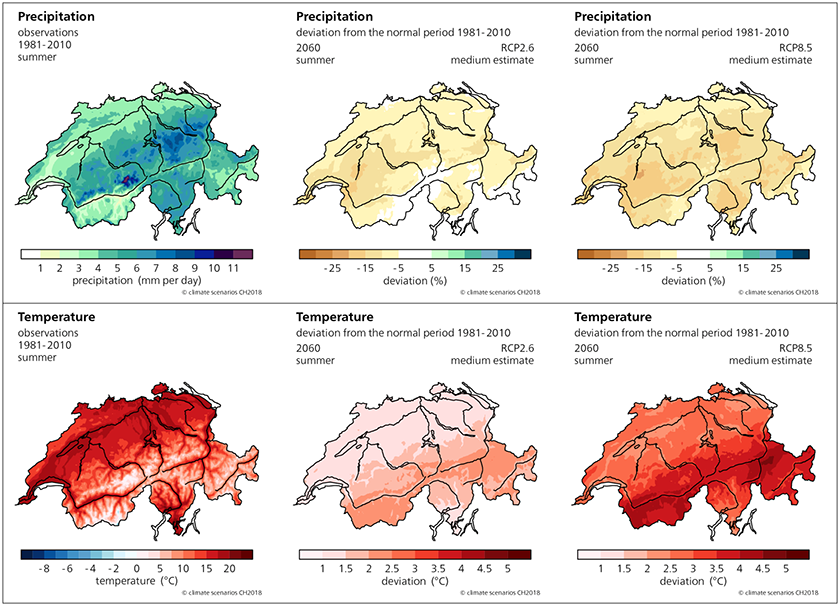Department Process Engineering
Water reuse Switzerland
The project "Water Reuse Switzerland" strives to generate an overview of the need, opportunities and risks of water reuse in Switzerland. The project is carried out in cooperation with external actors. The core group of the project involves members from the following organizations:
- Federal Office for the Environment (FOEN)
- Office for Waste, Water, Energy and Air of the Canton of Zurich
- Office for Water and Waste of the Canton of Bern
- Office for the Environment of the Canton of Solothurn
- General Directorate for the Environment of the Canton of Vaud
In addition, there is an advisory group whose members provide selective support with their expertise:
- Stakeholders from agriculture (Federal Office for Agriculture, Agroscope)
- Eawag departments: Aquatic Ecology, Urban Water Management, Environmental Chemistry, Environmental Microbiology, Environmental Social Sciences, Process Engineering, Water Resources & Drinking Water
- Authorities of the cantons of Geneva and Thurgau
- Swiss Association of Municipal Infrastructure (SVKI)
- Swiss Gas and Water Industry Association (SVGW)
- Association of Swiss Wastewater and Water Pollution Control Professionals (VSA)
- Other universities of applied sciences and universities: Bern University of Applied Sciences (BFH), Technical University of Munich (TUM).
For the time being the project will run until May 2024, in the course of which the following work packages will be addressed:
- Fundamental investigation: current legal basis for water reuse in Switzerland and nearby countries;
- Water availability and demand: quantitative estimation of the potential of water reuse in Switzerland;
- Scenario analysis: To enable the development of resilient strategies for Switzerland's water management in the future, different scenarios are analyzed. The scenarios are selected to cover a wide range of options how the future could look like.
- Water quality: What water quality requirements have to be met for different water reuse applications?
- Stakeholders in Switzerland: What are the needs of different stakeholders at federal, cantonal and municipal level? What wishes, concerns and opportunities does the advisory group see for the topic of water reuse? What aspects regarding social acceptance need to be considered in general?
Further projects on water reuse have been and are being carried out at Eawag, with a focus on the decentralized sector:
Wings (Innovationen im Bereich nicht-netzwerk basierter Wasser- und Abwassersysteme)
Lighthouse Initiatives for Decentralised Urban Water Management
What is water reuse?
During water reuse, wastewater is treated centrally or decentrally and can then be used as an alternative water resource for various applications:
- Agricultural irrrigation
- Irrigation of urban green infrastructure
- Industry
- Household applications
- Cleaning purposes e.g. roads or sewers
Water reuse is already an established practice in countries and regions with low water availability. The European Union has also set itself the goal of promoting water reuse in the member states. As of 26.06.2023, the corresponding Regulation 2020/741 on minimum requirements for water reuse in agriculture has entered into force, but only for those Member States that have opted for the national implementation of the Regulation.
How relevant is water reuse for Switzerland?
In Switzerland, an increase in heat waves and dry periods is expected for the future due to climate change. This will be accompanied by an increase in water demand for irrigation, which in turn will also be amplified by the increased implementation of the sponge city concept in urban areas. The demand for cooling water is expected to increase as well, due to the rising temperatures.
By using recycled water, withdrawals of water from surface waters and groundwater can be substituted, which would contribute to the protection of these waters bodies. The ecological quality of surface waters can also be improved by reducing the discharge of wastewater treatment plant effluents.
In order to reduce the emission of micropollutants into the environment, Switzerland is advancing with the implementation of an additional fourth treatment stage at wastewater treatment plants. As a result, there are already good technological
What has to be considered?
Regarding the subject of water reuse, quantitative requirements (ecological minimum flows) as well as qualitative aspects (biological and chemical water quality) have to be considered. The environmental compartments (soil, groundwater, surface water, plants, humans) that can potentially be affected by water reuse have to be protected and must not be adversely affected by the practice. Furthermore, it is important to consider social aspects such as the acceptance and institutional legitimacy of water reuse projects.
Glossary
In the literature on water reuse, certain terms are regularly utilized. A selection is defined below, to create a common understanding of the subject.
Wastewater
Water that has been altered by domestic, industrial, commercial, agricultural or other uses, as well as water that flows which such altered water continuously through the sewer system, or rainwater that runs off fortified or paved areas. [1] - Art. 4 (e)
Service water
Water that is not intended for direct human consumption. As a result, the water quality does not usually have to meet drinking water standards. Service water can be obtained from conventional water bodies such as surface waters or groundwater, but also from wastewater treatment plant effluent. It must be distributed in its own pipe system, separated from drinking water. [2]
Brownwater
With separation toilets, urine is collected separately. The remaining wastewater stream contains flushing water, feces and toilet paper and is called brown water. [3]
Decentralized wastewater management
Wastewater generated on a building level is collected locally and treated on site. This option can be applied in cases where no connection to a central sewage system is possible/reasonable or existing infrastructure should not be further burdened. The treated wastewater is available for reuse on site. Decentralized wastewater treatment approaches can be based on material flow separation. In this case, wastewater with different pollution loads (grey water, black/brown water, yellow water) is treated appropriately. [4]
Yellowwater
Wastewater from separation toilets containing only urine and optionally flushing water. [5]
Greywater
Wastewater originating from bathrooms (sinks, showers, bathtubs, washing machines) and kitchens (kitchen sinks, dishwashers), excluding wastewater from toilets. [6]
Indirect water reuse
Treated wastewater from wastewater treatment plants is usually discharged into a receiving water body, commonly a river or lake. During indirect water reuse, water is taken from such a receiving water body and utilized e.g. for drinking water production, agricultural irrigation or other purposes. Although the share of treated wastewater in different surface waters can be significant, especially during dry periods, this fact is usually not explicitly considered in water quality regulations or risk management plans.
Further utilized terms for this practice are "unplanned reuse" or "de facto reuse". [7]
Blackwater
Wastewater containing flushing water, toilet paper, feces and urine. [4]
Drought stress in plants
Drought stress or water stress in plants occurs when the water available in the soil and the actual evapotranspiration of a plant that depends on it is less than the potential evapotranspiration. [8]
Water stress
The water use index describes the ratio of anthropogenic water withdrawals to available renewable water resources. A water use index greater than or equal to 20% is internationally considered as water stress. [8]
Water reuse
Intended and planned utilization of treated wastewater. The treatment can go beyond conventional wastewater treatment, depending on the required quality of the reused water. [9]
The term «water reclamation» is used as a synonym for «water reuse». [7]
Central wastewater management
All the produced wastewater (grey water, black water, toilet flush water, and in the case of combined sewer systems also storm water) is discharged via the sewer system and conveyed to a central wastewater treatment plant. There, the wastewater is treated and the cleaned wastewater treatment plant effluent is usually discharged into a receiving water body. [10]
Literature
[2] VSA. Glossary – «Brauchwasser»
[3] VSA. Glossary – «Braunwasser»
[5] VSA. Glossary – «Gelbwasser»
[6] Eawag (2021). Fact sheet «Greywater»
[8] IPCC (2007). Climate Change (2007). Synthesis Report
[9] German Environment Agency (10.05.2021). Questions and Answers on Water Reuse
[10] Eawag. Wastewater treatment – centralised, decentralised, hybrid


